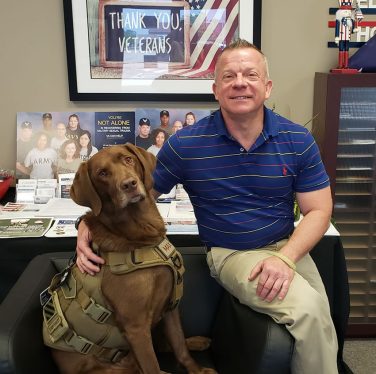Welcome to ReCHAI
People and animals have lived close to one another for centuries. The human-animal bond is the strong connection that they feel toward one another. The MU College of Veterinary Medicine is proud of this exciting center based on the growing field of research showing how the human-animal bond impacts health in people and animals.
May Announcement
This year marks the 20th anniversary of the Research Center for Human-Animal Interaction (ReCHAI), and this month marks one year since we lost its founder, Dr. Rebecca Johnson. With her background in nursing and gerontology, Dr. Johnson was instrumental in forging a relationship between the Sinclair School of Nursing, the College of Veterinary Medicine and TigerPlace, an independent living community in Columbia where pets are welcome and visited monthly by a team of veterinary students and a faculty veterinarian. Dr. Johnson’s passion for the human-animal bond elevated our program to the world stage, as she was elected to the role of president of the International Association of Human-Animal Interaction Organizations. She continued to lead ReCHAI until her retirement in 2019 and beyond. She was still passionately promoting ReCHAI just days before her passing, and we are honored to continue her legacy of protecting, promoting and seeking to fully understand the power of the human-animal bond.


Who we are:
The Research Center for Human-Animal Interaction (ReCHAI), founded in 2005, in College of Veterinary Medicine has a mission of education and conducting programs and studies about the benefits of human-animal interaction. ReCHAI is on the leading edge of programs and studies that explore how the human-animal bond has an impact on the health of people and animals.

ReCHAI is designed to:
- Develop a program for research and education to study the health benefits of human-animal interaction (HAI).
- Promote the science of HAI.
- Document evidence demonstrating Animal Assisted Interventions (AAI) as a beneficial form of complementary therapy.
- Foster educational and research opportunities for MU students, as well as students from around the country and globe.
- Collaborate with other centers nationally and internationally to promote HAI.
- Foster public understanding of benefits of HAI.

Member of
